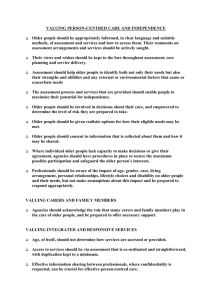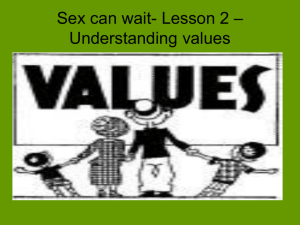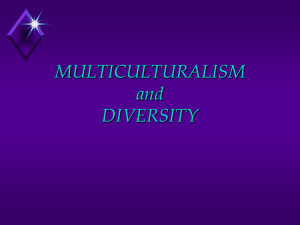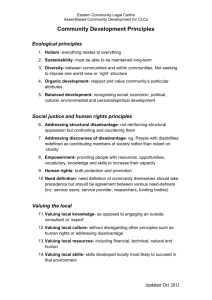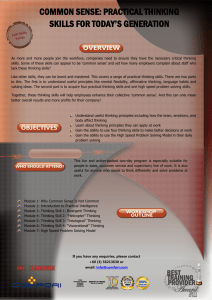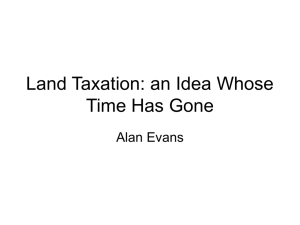A GOOD PLACE TO START: A “WORKING” DEFINITION 1
advertisement
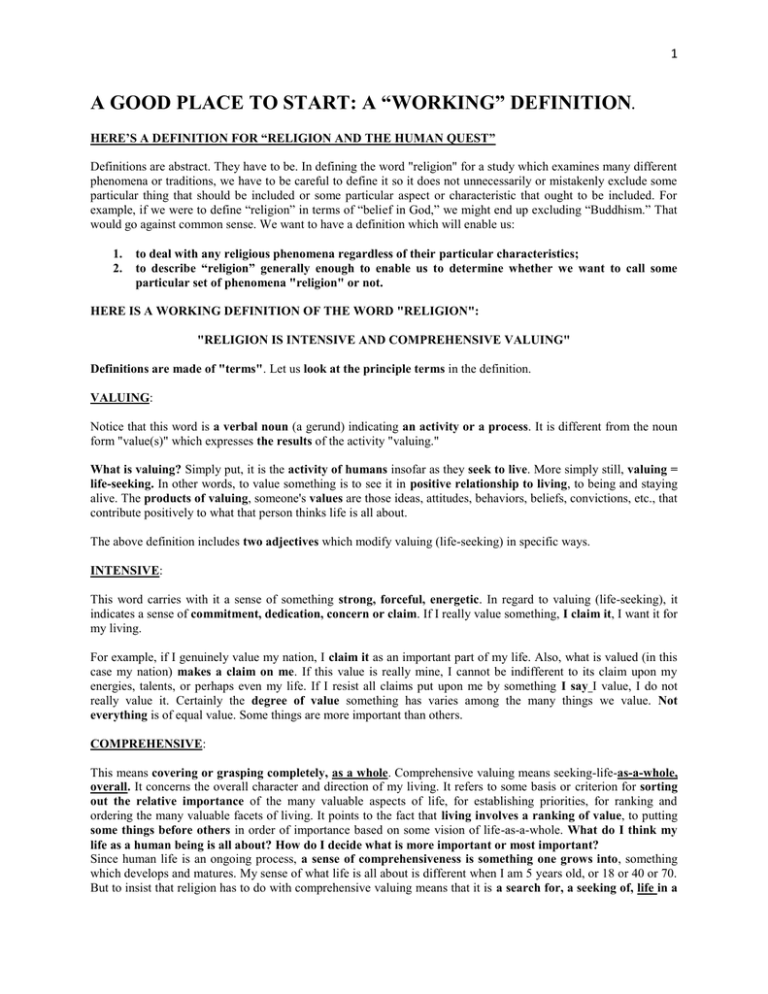
1 A GOOD PLACE TO START: A “WORKING” DEFINITION. HERE’S A DEFINITION FOR “RELIGION AND THE HUMAN QUEST” Definitions are abstract. They have to be. In defining the word "religion" for a study which examines many different phenomena or traditions, we have to be careful to define it so it does not unnecessarily or mistakenly exclude some particular thing that should be included or some particular aspect or characteristic that ought to be included. For example, if we were to define “religion” in terms of “belief in God,” we might end up excluding “Buddhism.” That would go against common sense. We want to have a definition which will enable us: 1. 2. to deal with any religious phenomena regardless of their particular characteristics; to describe “religion” generally enough to enable us to determine whether we want to call some particular set of phenomena "religion" or not. HERE IS A WORKING DEFINITION OF THE WORD "RELIGION": "RELIGION IS INTENSIVE AND COMPREHENSIVE VALUING" Definitions are made of "terms". Let us look at the principle terms in the definition. VALUING: Notice that this word is a verbal noun (a gerund) indicating an activity or a process. It is different from the noun form "value(s)" which expresses the results of the activity "valuing." What is valuing? Simply put, it is the activity of humans insofar as they seek to live. More simply still, valuing = life-seeking. In other words, to value something is to see it in positive relationship to living, to being and staying alive. The products of valuing, someone's values are those ideas, attitudes, behaviors, beliefs, convictions, etc., that contribute positively to what that person thinks life is all about. The above definition includes two adjectives which modify valuing (life-seeking) in specific ways. INTENSIVE: This word carries with it a sense of something strong, forceful, energetic. In regard to valuing (life-seeking), it indicates a sense of commitment, dedication, concern or claim. If I really value something, I claim it, I want it for my living. For example, if I genuinely value my nation, I claim it as an important part of my life. Also, what is valued (in this case my nation) makes a claim on me. If this value is really mine, I cannot be indifferent to its claim upon my energies, talents, or perhaps even my life. If I resist all claims put upon me by something I say I value, I do not really value it. Certainly the degree of value something has varies among the many things we value. Not everything is of equal value. Some things are more important than others. COMPREHENSIVE: This means covering or grasping completely, as a whole. Comprehensive valuing means seeking-life-as-a-whole, overall. It concerns the overall character and direction of my living. It refers to some basis or criterion for sorting out the relative importance of the many valuable aspects of life, for establishing priorities, for ranking and ordering the many valuable facets of living. It points to the fact that living involves a ranking of value, to putting some things before others in order of importance based on some vision of life-as-a-whole. What do I think my life as a human being is all about? How do I decide what is more important or most important? Since human life is an ongoing process, a sense of comprehensiveness is something one grows into, something which develops and matures. My sense of what life is all about is different when I am 5 years old, or 18 or 40 or 70. But to insist that religion has to do with comprehensive valuing means that it is a search for, a seeking of, life in a 2 way that seeks to discover the meaning, purpose and value of life as a whole. So the very notion of “religion” as valuing implies a quest, a search. Summary: For purposes of this course, then, the word "religion" will be used to refer to that activity of human beings by which they seek life in a way that is both energetic and committed, on the one hand, and concerned life in terms of its overall direction, purpose and meaning, on the other. RELIGION = INTENSIVE AND COMPREHESNSIVE VALUING. [NOTE: Although I have modified it somewhat, I am indebted to the philosopher Frederick Ferre for this basic approach to the definition of “religion.”] A FURTHER CLARIFICATION OF TERMS: The study of religion involves studying the particular ways human beings have searched for the meaning of life and how they have gathered and stored what they have learned from experience.. This kind of study has many aspects and approaches as we have seen. Since we have not identified "religion" with any particular aspects of religion, such as beliefs, rituals, laws, practices like "belief in God," "offering sacrifice," "not lying," or "going to church," it will be possible to apply our definition in many and varied settings. For a further clarification of the term "religion" as we have defined it, let us engage in a brief exercise to help clarify what religion is not. People often use the word “religion” in ways that conflict with this definition, particularly when they identify “religion” with its external forms rather than with the underlying activity that produces those forms. It is possible for something to look religious at fist glance but actually be a distortion of “religion” as we have defined it. We need words for these kinds of situations also. Since we have qualified "valuing" with two adjectives, "intensive" and "comprehensive", we can discuss four logical possibilities: 1) intensive and comprehensive valuing. 2) intensive but not-comprehensive valuing; 3) comprehensive but not-intensive valuing; 4) valuing which is neither intensive nor comprehensive. 1) The first of these we have been discussing. We have called this “religion.” 2) The second a kind of valuing (intensive but not comprehensive) may show great energy and commitment. It focuses wholeheartedly on something as if it were the overall meaning or purpose of life. However, in this case, the something which in fact falls short of that wholeness. For this we will use the terms OBSESSION or FANATICISM even if it includes much of what we would consider "religious" trappings (beliefs, rituals, practices, etc.). It tears a piece out of reality and elevates it to the status of the whole. Maybe it is a political piece, or a racial piece, or a cultural piece, or some other piece. Obsession can take many forms. Individually, one can become so preoccupied with football or sex or money or power or success that everything else in one’s life is subordinated to it. Another word for this is “addiction,” where something tells me what to do even until it wrecks my life and that of those around me. Maybe I come to live just for drugs or alcohol. They tell me what to do until the take my life over. It is possible even for “religious” practice to become obsessive. A somewhat trivial example makes the point: I may be wholly convinced (intensive) that the most important thing in life is electric trains. I put every bit of time and money I have into buying and building and running electric trains. But, guess what? There is no escaping the fact that there is more to life than electric trains. If I were to pursue this without eating, or drinking or sleeping, I would soon be dead. Death is the end of valuing. So point is that such a piecemeal approach to life is an imposter of religion as we have defined it. Fanaticism is another fraudulent way of valuing that treats of a part as though it were the whole. One thinks of National Socialism in Germany in the 1930s, or of Soviet Marxist Leninism, of the Ku Klux Klan as extreme examples. However, such imposters can be found even in less grand examples of bigotry, intolerance or oppression when one individual or group aims harm at another individual or group. It is worth noting that such imposters often create reactions that are no less distorted, distortions that serve to reinforce the fanaticism of the other. 3 Some people have difficulty grasping the point of COMPREHENSIVENESS because they assume that “religion” is individual and subjective and without a relationship to the real world. 3. A third kind of valuing occurs when an individual or a group might know or even go through the motions of some particular value system but remains interiorly unmoved by it. The term for this kind of will be INDIFFERENCE. 4. Apathy: A fourth logical possibility may be mostly a logical possibility. It is difficult to imagine any real or genuine valuing that is neither intensive nor comprehensive except perhaps in fiction. One thinks of the sort of character found in Albert Camus' The Stranger. Here the chief character seems virtually without any sense of engagement with life.
